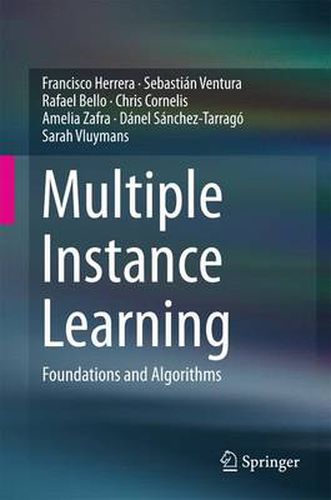Readings Newsletter
Become a Readings Member to make your shopping experience even easier.
Sign in or sign up for free!
You’re not far away from qualifying for FREE standard shipping within Australia
You’ve qualified for FREE standard shipping within Australia
The cart is loading…






This title is printed to order. This book may have been self-published. If so, we cannot guarantee the quality of the content. In the main most books will have gone through the editing process however some may not. We therefore suggest that you be aware of this before ordering this book. If in doubt check either the author or publisher’s details as we are unable to accept any returns unless they are faulty. Please contact us if you have any questions.
This book provides a general overview of multiple instance learning (MIL), defining the framework and covering the central paradigms. The authors discuss the most important algorithms for MIL such as classification, regression and clustering. With a focus on classification, a taxonomy is set and the most relevant proposals are specified. Efficient algorithms are developed to discover relevant information when working with uncertainty. Key representative applications are included. This book carries out a study of the key related fields of distance metrics and alternative hypothesis. Chapters examine new and developing aspects of MIL such as data reduction for multi-instance problems and imbalanced MIL data. Class imbalance for multi-instance problems is defined at the bag level, a type of representation that utilizes ambiguity due to the fact that bag labels are available, but the labels of the individual instances are not defined. Additionally, multiple instance multiple label learning is explored. This learning framework introduces flexibility and ambiguity in the object representation providing a natural formulation for representing complicated objects. Thus, an object is represented by a bag of instances and is allowed to have associated multiple class labels simultaneously.
This book is suitable for developers and engineers working to apply MIL techniques to solve a variety of real-world problems. It is also useful for researchers or students seeking a thorough overview of MIL literature, methods, and tools.
$9.00 standard shipping within Australia
FREE standard shipping within Australia for orders over $100.00
Express & International shipping calculated at checkout
This title is printed to order. This book may have been self-published. If so, we cannot guarantee the quality of the content. In the main most books will have gone through the editing process however some may not. We therefore suggest that you be aware of this before ordering this book. If in doubt check either the author or publisher’s details as we are unable to accept any returns unless they are faulty. Please contact us if you have any questions.
This book provides a general overview of multiple instance learning (MIL), defining the framework and covering the central paradigms. The authors discuss the most important algorithms for MIL such as classification, regression and clustering. With a focus on classification, a taxonomy is set and the most relevant proposals are specified. Efficient algorithms are developed to discover relevant information when working with uncertainty. Key representative applications are included. This book carries out a study of the key related fields of distance metrics and alternative hypothesis. Chapters examine new and developing aspects of MIL such as data reduction for multi-instance problems and imbalanced MIL data. Class imbalance for multi-instance problems is defined at the bag level, a type of representation that utilizes ambiguity due to the fact that bag labels are available, but the labels of the individual instances are not defined. Additionally, multiple instance multiple label learning is explored. This learning framework introduces flexibility and ambiguity in the object representation providing a natural formulation for representing complicated objects. Thus, an object is represented by a bag of instances and is allowed to have associated multiple class labels simultaneously.
This book is suitable for developers and engineers working to apply MIL techniques to solve a variety of real-world problems. It is also useful for researchers or students seeking a thorough overview of MIL literature, methods, and tools.